If you live in Pennsylvania and are buying a pool, you have a lot to think about – and a lot of options to consider. Whether you want your pool to be the hub of activity in your backyard or an extension of your home, there’s a pool to fit every lifestyle. However, keep in mind that a pool is only part of the package! PA residents experience all four seasons, ranging from hot, humid summers to chilly winters and autumnal weather marked by beautiful foliage. Accessories like an automatic pool cover and a winter cover can help keep falling leaves and debris out, making upkeep even easier while saving on energy costs.
To help you make the best decision for your needs, we’ll guide you through the basics of owning a pool in Pennsylvania, why you may want to opt for either a fiberglass or vinyl liner pool, maintenance tips, and some of the ever-changing state and local regulations on pool ownership. Let’s dive in!
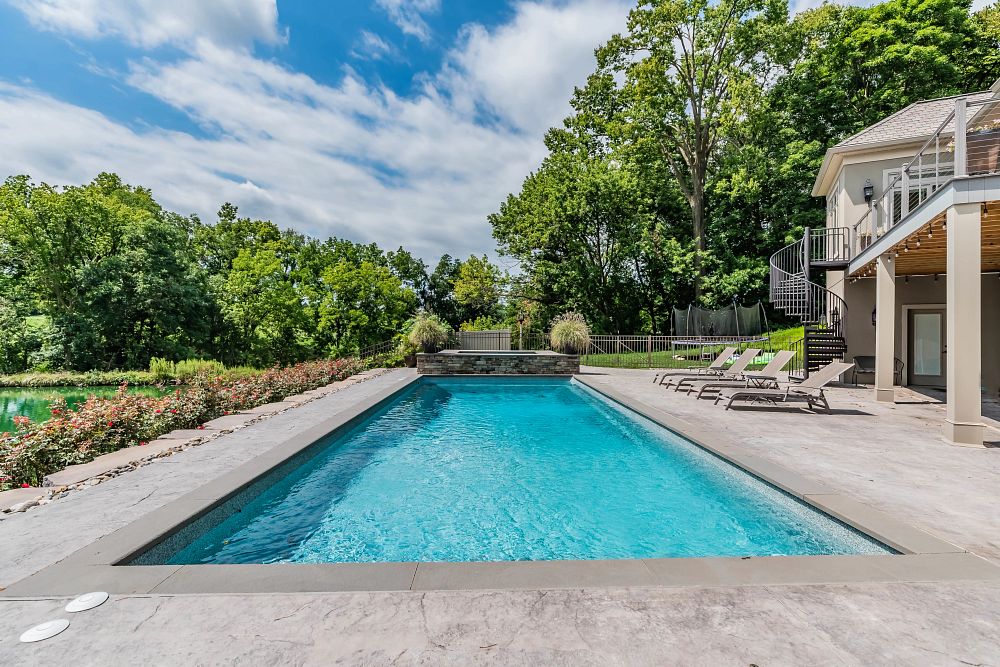
Fiberglass Pools in PA
Fiberglass pools offer a gloriously smooth finish that makes them easy on the feet and won’t snag your swimsuit. They’re also a breeze to install. Fiberglass pool shells are prefabricated and can be transported into an excavated area in your backyard. This speeds up installation time, which means you get to enjoy your pool even sooner.
fiberglass pools are also easy to maintain and renowned for their structural integrity. Compared to older materials like concrete or gunite pools, fiberglass requires considerably less scrubbing and worry about algae bloom and calcium deposits. That means more time for you to enjoy your pool!
Learn more about the benefits of owning a fiberglass pool.
Fiberglass Pool Designs for Pennsylvania Inground Pools
If you’ve been dreaming of adding a pool to your backyard, you probably have a distinct vision in mind. Maybe you love the graceful lines of a rectangular fiberglass pool or prefer the winding curves of a freeform pool. Pools come in a variety of shapes, sizes, and colors. but when it comes to pool design, choosing a shape is just one part of your project. How your pool fits into your lifestyle is another major factor.
Think about how you plan to use your pool and who will use it:
- Do you have young children or teens?
- Will they bring friends over to use the pool?
- Do you love to entertain and imagine your pool at the center of cookouts and backyard BBQs?
- Do you plan to use your pool for exercise or relaxation? Asking yourself these questions can help you design a pool that works for you so you can play!
You’ll also want to consider how your property layout supports the design of your pool. Think about how your pool will fit into its surroundings – from landscaping to decking to the type of fencing you have around your yard.
You may initially be drawn to a particular shape. However, after speaking with an independent pool builder, you may discover that another shape in a different size may work better for how you plan to use your pool and any constraints of your property. For instance, if you have a smaller or sloped backyard, your builder can recommend options to work with your yard and also help you make sure your new pool conforms to state and local pool regulations.
Whatever your style or aesthetic may be, Latham can make it work with your regional parameters. We’ll show you some breathtaking real-life examples of pools in their natural habitat here, but remember: just because there isn’t a picture, that doesn’t mean it’s not possible! If you’re looking for even more local examples of pools, contact your local builder to see additional photos, videos, or walkthroughs.
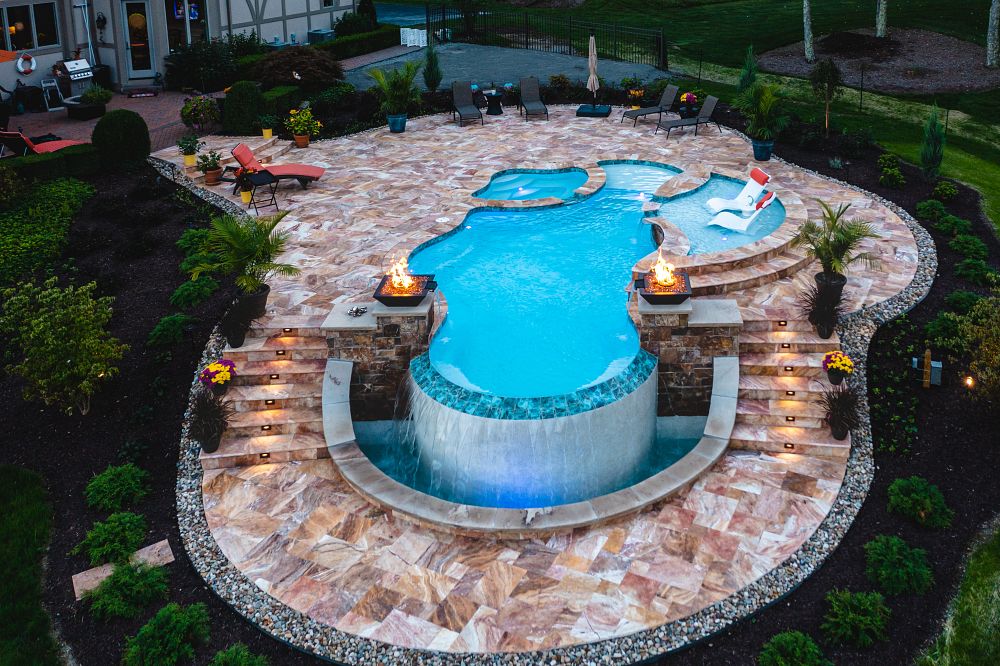
Pool Ideas For Small Backyards
Just because you have a smaller backyard doesn’t mean you can’t have a pool! Homeowners in urban PA areas like Philly or Pittsburgh often have smaller yards. More compact models can give you all the fun of a larger pool, but in a smaller package.
Rectangular pools like the 11’ x 20’ Tuscan keep things simple and streamlined – and with plenty of space to swim laps. Similarly, a rectangular-shaped plunge pool, like the 10’ x 16’ Milan packs a ton of features into a small space, as well as a more shallow 4’ depth for homeowners who just want to wade or float.
Kidney-shaped pools are another stylish classic that can easily tuck into a smaller backyard, such as the feature-rich 10’ x 20’ Jamaica model, with slip-resistant, elegant wedding-cake steps and swim-up seating.
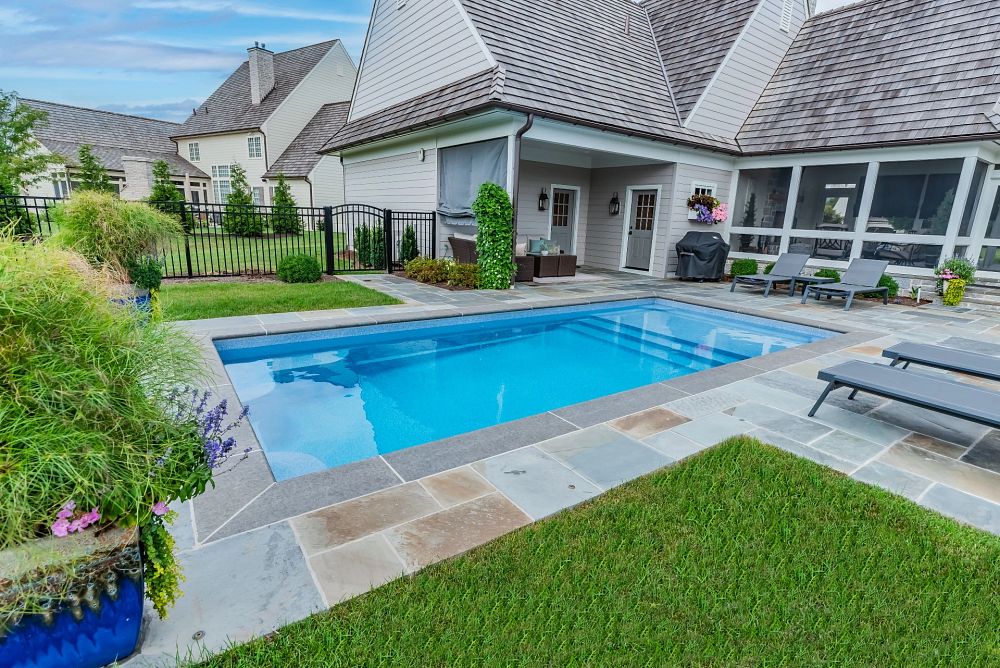
Pool Ideas for Larger Yards
If you have a larger yard, your only limitation for a backyard oasis is your imagination and your budget. The question is, whether you want your pool to be a part of your backyard or a focal point?
If you plan to incorporate an outdoor kitchen or grilling station or want to use part of your backyard to grow a garden, consider a small-to-medium sized 14’ x 30’ pool, like the Laguna or Laguna Deluxe, which features a smaller wading area perfect for kids to join in the fun.
On the flipside, if you want your pool to be the center of the action, consider a larger model, pre-loaded with features like the modern freeform Cancun Deluxe, with a built-in spillover spa, swim-up seating, and an ultra-wide top step that can double as a small tanning ledge. If your goal is a lively place for family and friends to congregate, a larger-sized freeform pool can be a gorgeous centerpiece for your backyard, surrounded by decking and landscaping to offset its winding curves.
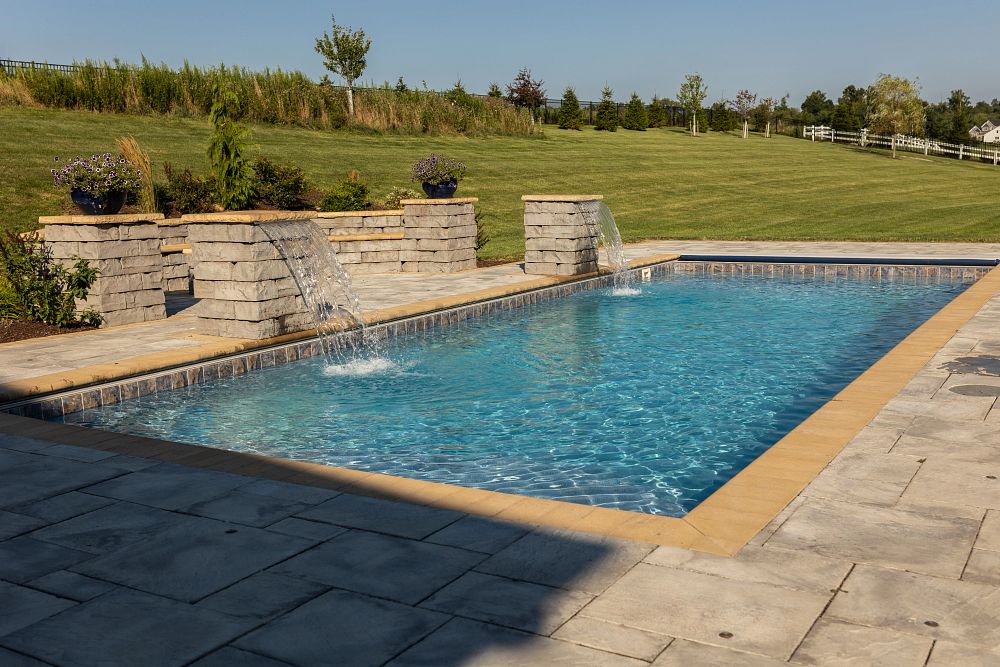
Pools for Irregular or Sloped Yards
If you have an irregularly shaped yard, freeform and kidney-shaped pools can be great options. These pools differ slightly from model-to-model, allowing you to find one that fits the unique shape and contours of your yard. For instance, the modern freeform Genesis is more narrow at 16’ wide, but has a longer 40’ width. For smaller irregularly shaped yards, a traditional freeform model, like the 12’ x 25’ Freeport can fit the bill.
If you have an unusually shaped backyard, come to the table with your measurements. A licensed professional builder can help you find options that will work with the shape of your yard, as well as deliver the experience you want from your pool.
But irregularly shaped yards just skim the surface. (Pardon the pun.) Pennsylvania is home to both valleys and mountainous stretches, which can translate to uneven backyards or rocky terrain beneath the soil that can create a barrier to installing a pool.
In some cases, a licensed professional builder can grade your land to make it hospitable to a fiberglass pool. However, there may be some instances where a vinyl liner pool may be a better fit, offering more flexibility of customization due to their construction, compared to prefabricated fiberglass pool shells. If this is the case, be open to new ideas, as vinyl liner pools come in many of the same beautiful shapes and models as their fiberglass counterparts. What matters most is finding a pool that can work with your unique backyard features to give you the most enjoyment.
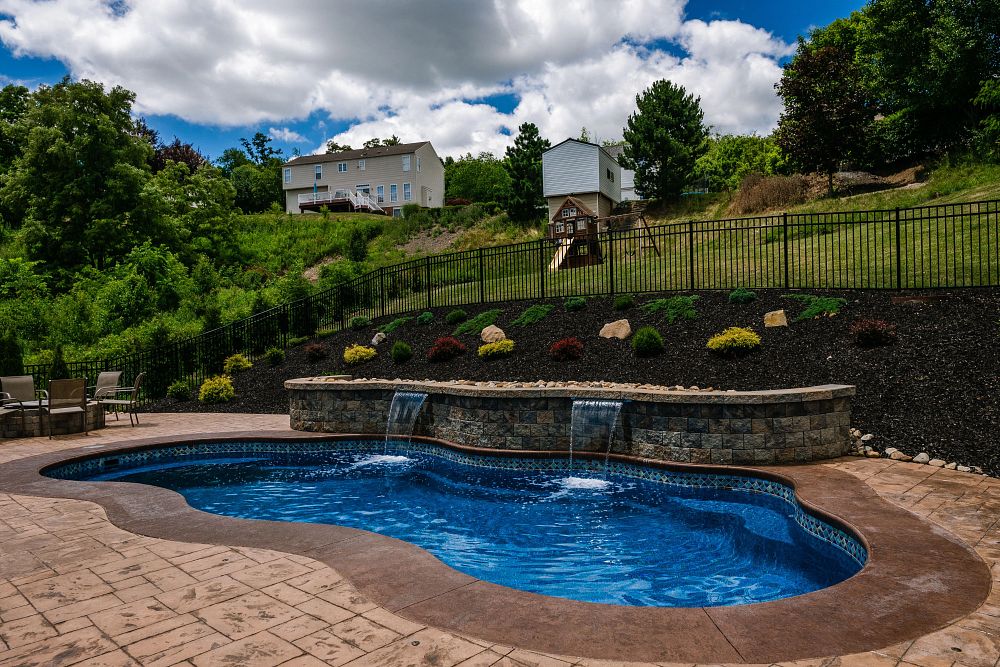
Fiberglass Options To Work With Your Lifestyle
When you’re thinking about your pool’s design, consider what features you may want to include to be sure everyone can enjoy it. Maybe you have small children, older or mobility-comprised individuals who will use your pool. Making sure your pool is safe and accessible for them ensures that everyone gets to enjoy the pool.
Consider fiberglass pools that have multiple entry points and/or wading areas, perfect for kids – like the Astoria, which boasts both in addition to slip-resistant steps and a built-in spa. Similarly, the Astoria can be a great option for folks who plan to use their pool for exercise and swimming laps, as well as easing sore muscles in its spillover spa.
If the kids have flown the nest and you’re leaning into your golden years, a pool like the Axiom 14 can be a great option that works for entertaining friends and family, in a relatively compact package. Features like swim-up seating and a beverage bar make it a great place for friends to chill out, and a generous underwater tanning ledge gives you a spot that’s ideal for lounging without fully submerging yourself.
Think about how you plan to use your pool and you’re bound to find a model that incorporates features to help you live your best pool life now and well into the future!
Inground Vinyl Liner Pools in Pennsylvania
Inground vinyl liner pools are another popular choice for pools in Pennsylvania. These types of pools are known for their longevity, cost-effectiveness, ease of maintenance, and are highly customizable. A well-maintained vinyl liner can last roughly 10 years, but you can replace it sooner for a relatively inexpensive way to refresh the look of your pool. Vinyl liner pools are also an affordable option for refurbishing older concrete pools.
Vinyl Liner Pool Designs for Pennsylvania Homes
Vinyl liner pools offer a ton of flexibility in terms of design. While there are a wide variety of vinyl liner pool shapes and sizes, vinyl liner pools can be further customized to accommodate add-ons like tanning ledges before vinyl is laid over the structure. Additionally, because vinyl liner pools are poured into place, they can be an excellent choice for homes that have uneven backyards.
Vinyl liner pools are highly customizable. While some of the photos here are prime examples of their beauty and flexibility of design, builders have the capability to create a vinyl liner design that meets your unique needs. Even if you don’t see a photo of your dream pool, chatting with your local builder can give you access to photos and videos of custom vinyl liner pool designs that they haven’t added to an online portfolio. Think of these images as a springboard to limitless possibilities!
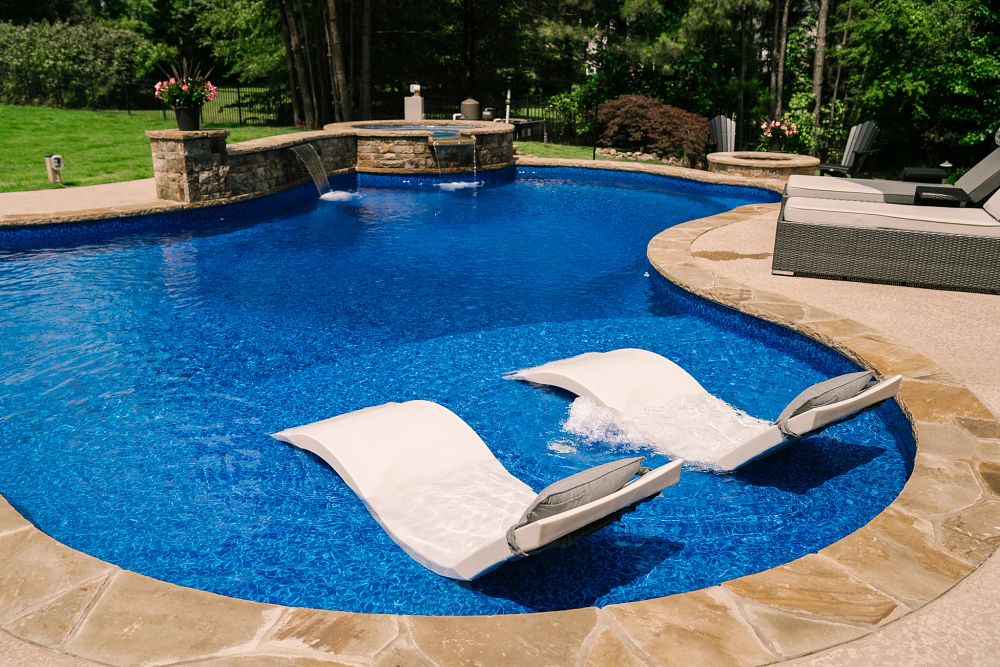
Benefits of Vinyl Liner Pools for Pennsylvania Homes
While fiberglass pools are touted for their beauty and ease of maintenance, don’t sleep on vinyl liner pools! There are numerous vinyl liner pool benefits. Here are just a few that may be of particular interest to Pennsylvania residents.
Flexibility of Design
From a variety of add-on features to liner colors and patterns, vinyl liner pools are highly customizable and come in a range of shapes and sizes. A licensed professional builder can tweak an existing vinyl liner pool design to incorporate tanning ledges or wading areas perfect for kids and seniors, custom stairs and multiple entry points.
As a starting point, shapes can range from classic rectangular and kidney-shaped models, to more eclectic shapes like freeform or L-shaped models that can work beautifully for irregularly-shaped yards.
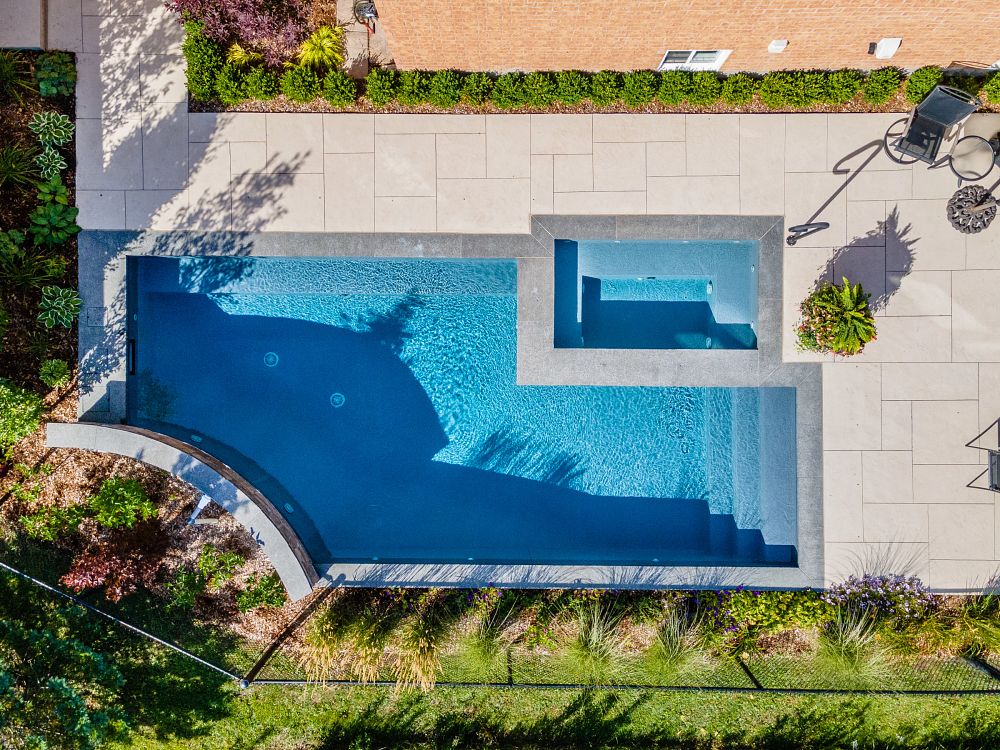
For PA residents who live in metro areas like Philadelphia or Pittsburgh with smaller backyards, vinyl liner models like the Gemini come in small, medium, large, and extra-large sizes – making it a great kidney-shaped option that fits into the vision you may have for your backyard. If you live in a suburban or more rural part of Pennsylvania, you have your pick of the litter with a wide range of medium-to-large sized models.
Great for Uneven Backyards
PA is known for its gorgeous natural scenery, hills and valleys. This diversity of geography can make its way into backyards, sometimes gracing homeowners with backyards that aren’t quite level or that sit on a slope or rocky terrain. Because of their highly customizable nature, vinyl liner pools can be an excellent choice. An expert professional builder can offer options to grade your backyard or install a retaining wall during the excavation process of your vinyl liner pool.
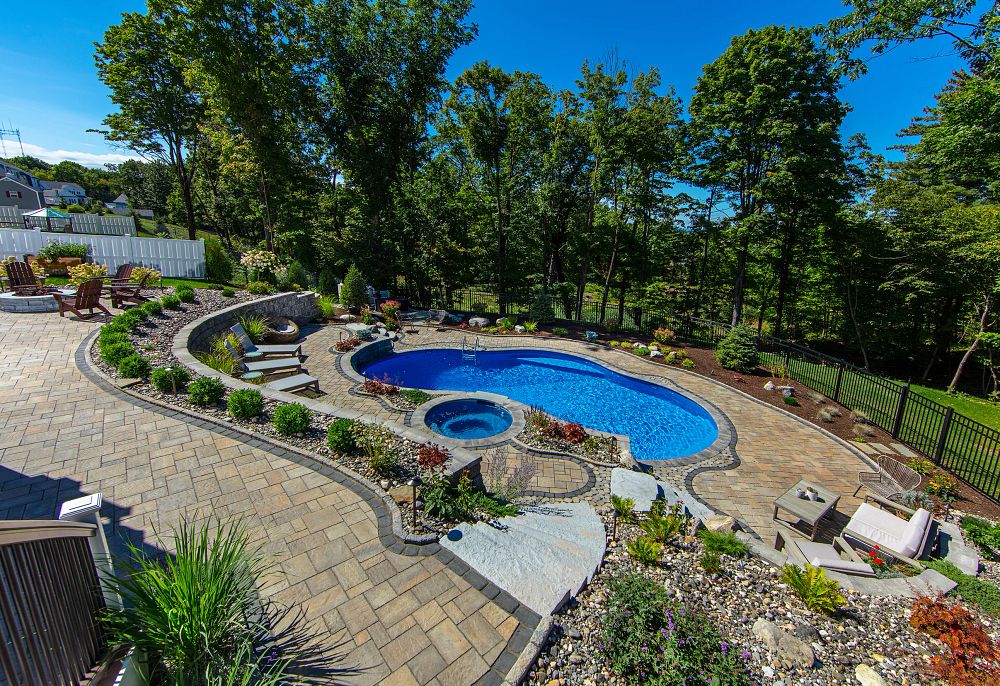
Vinyl Liner Pool Installation Process
Another benefit of vinyl liner pools is that they can be installed relatively quickly. For PA residents who typically use their pools from May til October, getting your pool up and fully operational can help you maximize time spent poolside once it’s installed.
From measuring your backyard to sealing your vinyl liner in place, learn more about what you can expect throughout the vinyl liner pool installation process.
When should you replace your vinyl liner or update your pool?
If your older vinyl liner pool develops a rip or a tear, replace your liner immediately. Liner tears can lead to leakage, which can throw off the balance of your water chemistry – among other problems! A well-maintained vinyl liner can last for nearly 10 years.
If you want to upgrade an existing pool and add new features, timing those updates to coincide with replacing your vinyl liner can save you both money and headaches in the long run. If you also plan to add any exciting new features – like pool lights or bubble jets – these should be done alongside replacing your vinyl liner as those projects are a bit more invasive and you’d need to remove and replace your liner anyway.
Transforming or Replacing Your Current Pool
Throughout Pennsylvania there are an estimated 1.2 million residential pools. However, many older pools were made from concrete or gunite. Coupled with Pennsylvania’s harsh winters, the state’s cold weather can play a role in gradually eroding the strength of concrete, causing it to age more rapidly – and become a financial drain to reinforce and repair every 10 years throughout the lifetime of your pool.
Concrete pools can become flaky and rough over time. Because concrete is porous, these pools can more easily develop pool algae. Not only can pool algae stain your pool, but it can make it more difficult to balance its water chemistry. That translates to more upkeep and less time enjoying your pool.
Replacing an older concrete or gunite pool with a new fiberglass or vinyl liner pool can be less costly to maintain over time. A well-maintained vinyl liner or fiberglass pool can last for decades and also be less of a time investment in terms of cleaning and maintenance.
Learn more about when and how to renovate an older pool.
Building the Perfect PA Pool Package: Covers and Winterizing Options
Regardless of whether you choose a fiberglass or vinyl liner pool, keep practical elements in mind and some room in your budget for a pool cover. Because PA residents experience all four seasons, it’s a good idea to invest in a cover.
Should I get an automatic pool cover in PA?
Automatic pool covers can help you save between 50% to 70% on energy costs, as well as reduce water evaporation and chemical usage to maintain your pool. An autocover can also save you time spent skimming your pool.
While the Pennsylvania’s fall foliage is certainly beautiful, it’s a lot less enjoyable when those leaves are scattered across the surface of your pool. Most importantly, autocovers can save lives, preventing kids and pets from accidentally falling in when unattended, as well as keeping unwanted visitors from hopping your fence and using your pool.
If you’re working with a smaller budget, many rectangular pool models are autocover-ready. More intricate shapes, such as freeform pools, may require a custom-cut autocover, which can be a bit more costly.
The Difference Between Winter Pool Covers and Autocovers
Due to PA’s cold winters and heavy snowfall, Pennsylvania pool owners should budget for a winter cover, as well as an automatic pool cover. While automatic pool covers add an element of safety to your pool, they aren’t made to support heavy piles of snow.
Although some areas of Pennsylvania receive less than 10 inches of snow annually, residents in the Northern part of PA or some of the state’s more mountainous areas can potentially get up to 90 inches of snow. Without a specially-designed winter cover made to support the weight of heavy snowfall, you could potentially compromise the mechanical components of your pool cover.
A specially-designed winter pool cover can help you safely close your pool before winter and can be removed when you’re ready to reopen your pool the following spring.
Learn more about how to winterize your pool.
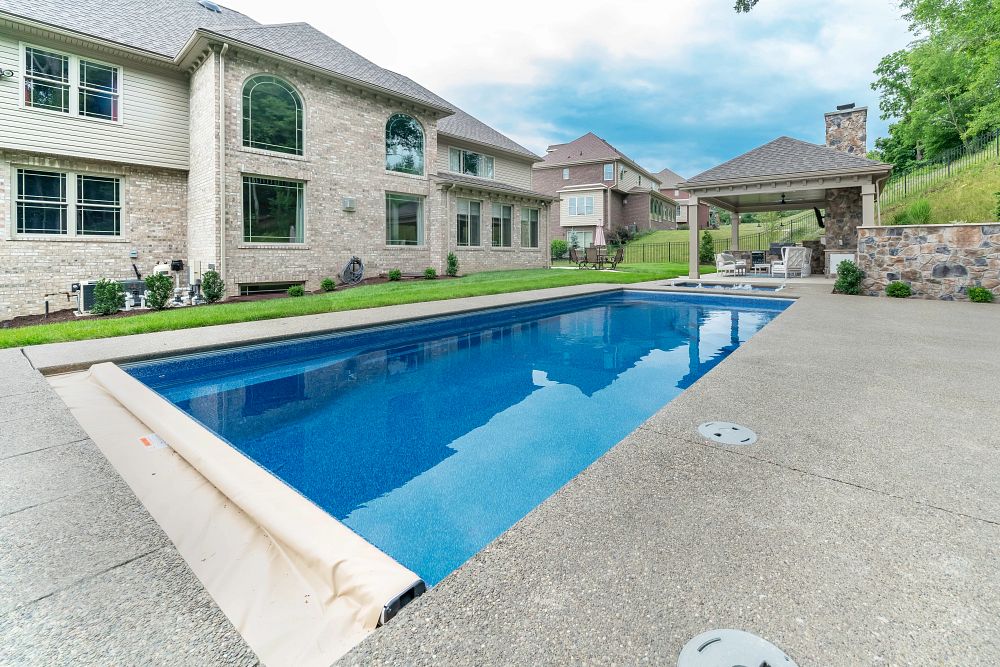
Pennsylvania Pool Maintenance Considerations
There’s a lot to love about both vinyl liner and fiberglass pools – including the fact that they’re relatively easy in terms of upkeep. However, depending on which type of material you choose for your new pool, you may have a slightly different task list and maintenance schedule to add to your calendar.
Maintaining Your Fiberglass Pool in Pennsylvania
Although fiberglass pools are low-maintenance, it’s important to keep up with weekly and monthly maintenance tasks. Set aside time each week to check your pool’s chemistry and water levels, as well as empty filter baskets.
Learn more about weekly and monthly/periodic fiberglass pool maintenance tasks.
Vinyl Liner Pool Maintenance in Pennsylvania
If you own or are planning to own a vinyl liner pool in Pennsylvania, it’s important to stick to a regular maintenance schedule to keep your pool looking its best. Not to worry! Vinyl liner pools are easy to maintain and require a little love to get the most enjoyment out of them.
In addition to weekly skimming and testing your water’s pH levels, prioritize time each week to gently scrub your vinyl liner with a soft bristle brush and only use soft pool toys made with vinyl liners in-mind. Periodically check your liner for leaks and patch them as soon as possible.
For even more tips, download our vinyl liner maintenance checklist to help you stay on top of keeping your pool sparkling!
Seasonal Pool Maintenance in Pennsylvania
Regardless of whether you choose a vinyl liner or fiberglass pool, in addition to regular upkeep, here are a few other seasonal tips to keep in mind if you own a pool in Pennsylvania.
- Fall: Pennsylvania’s abundance of trees and foliage can mean skimming your pool more often during autumn when leaves may fall into your pool.
- Spring: During spring months, pollen can wind up in your pool. If left to accumulate, it can clog your pool filter. Pollen can also lead to algae, if not skimmed off. Pollen in your pool looks like little yellow or green grains of rice floating on top of the water. Be sure to skim your pool regularly to help keep your pool looking its best and keep your water chemistry at the proper levels.
- Winter: Close your pool down before winter, taking care to make sure all air is removed from water lines and pool equipment, and that your skimmers are protected from cracking. You can either consider closing your pool yourself or enlist the aid of a professional service. Investing in a winter pool cover can also help to protect your pool during inclement weather. Winter covers are different from automatic pool covers and equipped to handle the weight of snow. In addition to following general best-practices for closing your pool, be sure that you look into any state and local guidance for closing your pool to minimize environmental impact. For instance, Pennsylvania’s Clean Stream Law prohibits emptying pool water without a permit, as pool water is chlorinated. In some instances, a permit is not required so long as pool owners leave water in the pool for at least one week without adding chlorine or other chemicals before draining.
Pennsylvania Inground Pool Costs
The total cost to install an inground pool in Pennsylvania can vary based on a number of factors. For instance, the size and materials are just one part of the equation. You’ll also want to consider the cost to install a deck around your pool, as well as accessories you may want to add – such as an automatic pool cover, water features, pool lights, a tanning ledge, or even a spillover spa.
Pennsylvania also requires that all residential pools (including hot tubs or spas) must be surrounded by a fence or barrier at least 48 inches high. When planning your PA pool, be sure to budget for necessary items to be sure your new pool is compliant with all state and local laws.
A backyard pool can provide endless enjoyment and family memories, but there is no denying that it can be a costly undertaking. But what they don’t realize is that, with the wide variety of pool financing options available, the dream of owning a pool is likely within reach for many homeowners. Learn more about financing options here.
Pennsylvania’s Regulations for Installing an Inground Pool
While owning a pool can unlock entirely new worlds of fun for Pennsylvania residents, the state has several requirements and regulations that pool owners must adhere to in order to be compliant.
Here are some of the most common questions about pool regulations in Pennsylvania. However, it’s important to remember that state and local laws can change over time, and that your local municipality may have even more stringent laws than those of the state. Do your research beforehand to be sure your pool is up-to-code. Working with a professional builder can help you more easily navigate the most recent codes, as well as help you secure the proper permits to build your new pool.
- Do I have to have a fence around my pool in Pennsylvania?
According to the Residential Code, all private pools in Pennsylvania must have a fence or barrier that meets standards set forth in the document. For starters, any structure that can contain more than 24 inches of water is classified as an outdoor swimming pool. This includes any above-ground or in-ground pool, as well as hot tubs and spas.According to PA laws, any fencing or barrier around a pool must be at least 48 inches above grade, measured on the side of the barrier that faces away from the swimming pool. Any openings in this fence or barrier “shall not allow passage of a 4-inch diameter sphere.” - Do you need a permit to build a pool in Pennsylvania?
A permit is required for all residential pools in Pennsylvania. That definition extends to any in-ground or above-ground structure that holds 24” or more of water, including hot tubs and spas.When applying for permits for your PA pool, be sure to check with your local building offices, as the types of permits you need may vary based on your municipality. For instance, Allentown, Pennsylvania requires a permit for all pools, as well as an electrical permit for “all pools equipped with motors, lights, filtering equipment, etc., regardless of dimension.”Similarly, Ferguson, PA requires a zoning permit for all swimming pools, however, “prefabricated swimming pools that are less than 24 inches deep are exempt from permitting.” (This could refer to small, portable “kiddie pools” for wading that can be stored away after use.) The township also notes that swimming pools “cannot be located in the front or side yard setback area but may be located in the rear yard setback, provided that no part of the pool, including paved areas and accessory structures excluding fencing, shall be located within 10 feet of the rear property line.”In addition to a swimming pool permit, Pennsylvania’s biggest metropolitan city, Philadelphia, also requires separate permits for any electrical and plumbing work associated with the pool. The city also requires that “work must be done by licensed professionals.” - How deep can a pool be in Pennsylvania?
Although there are no laws limiting maximum depth for residential pools in Pennsylvania, the state’s Residential Code requires a permit for all structures that contain at least 24 inches of water, defining them as a “swimming pool.” This depth extends to such structures as spas and hot tubs. Check with your local building office to be sure your pool meets all requirements before breaking ground.
Pennsylvania Pool Seasonality
Pennsylvania experiences the beauty of four full seasons every year. The state has hot, humid summers and cold winters with heavy snow. Spring and fall months can be fairly warm, but also usher in brisk weather.
While late May through early September is prime time for pool season in PA, adding a heater to your pool or a spillover spa can extend time spent in your pool. Typically, PA pool owners close their pools in either late September or early October and re-open in May.
Pennsylvania Pool FAQs
What type of inground pool is best for Pennsylvania?
Although both are relatively low-maintenance choices, fiberglass pools are popular for their smooth finish and ease of installation, while vinyl liner pools can be an affordable option that offers comparable benefits as fiberglass, as well as work with uneven backyard grading.
If you’re unsure of which option may be best for you, chat with a builder who can help you narrow down your choices and find a pool you’ll love for years to come.
How much value does a pool add to a house in Pennsylvania?
Adding a pool can increase your home’s resale value between 5% and 8%. However, even if you aren’t planning to sell your home, adding a pool can up the ante in terms of fun and enjoyment with decades of memories to be made.
When should I close my pool in Pennsylvania?
If you own a pool in Pennsylvania that’s not heated, you’ll want to close your pool before frosty temperatures set in – typically late September or early October. You can expect to re-open in early-to-mid-May. However, if you have a heated pool, you can likely keep your pool open between March and October.
Before winterizing your pool, it’s important to take stock of any state and local laws around draining your pool. Pennsylvania’s Clean Stream Law prohibits emptying pool water without a permit, although some areas of the state (such as Upper Providence Township in Montgomery County, PA) do not require a permit to empty pool water, as long as water is left in the pool for one week without chlorinating prior to training. Residents must then test the pH and chlorine levels of the water and can drain once no chlorine is detected.
Regardless of any local allowances around closing and draining your pool for the winter, Pennsylvania has strict laws against draining pool water into any body of water, including streams, ponds, or lakes.
How close to the house can a pool be in Pennsylvania?
Regulations around how close a pool can be to your house vary, making it important to confirm with your local building office. Working with a professional builder in your area can help you better understand local laws and boundary jurisdictions.
Typically, it’s recommended that a pool should be a minimum of 10 feet from a home. However, in Pennsylvania, different municipalities have different requirements. For instance, the city and county of Philadelphia requires that “in ground pools must be located a minimum distance from all property lines equal to the depth of the pool adjoining such property lines” – and will also need to follow proper fencing and barrier requirements.
It’s important to do your homework before breaking ground on a new pool to be sure that it meets all state and local guidelines. As these guidelines can change, working with a licensed professional pool builder can help you better understand the laws and ensure compliance.
How long will a fiberglass pool last in Pennsylvania?
A well-maintained fiberglass pool can last between 25 to 30 years, or potentially longer. If you decide to add a beautiful new pool to your backyard, you can expect it to be a beloved fixture for decades – and generations – to come.
Pennsylvania Inground Installation Areas
Want to install a pool in Pennsylvania? Latham is here to help you find the pool of your dreams. We’ve served many happy customers throughout PA, including those in:
- Scranton, PA
- Wilkes-Barre, PA
- Harrisburg, PA
- Williamsport, PA
- Greensburg, PA
- Pittsburgh, PA
- New Castle, PA
- Hazelton, PA
- State College, PA
- Allentown, PA
- Bloomsburg, PA
- Shippensburg, PA
- Mechanicsburg, PA
- Cranberry Township, PA
- Philadelphia, PA
- Lower Bucks County, PA
- Eastern Montgomery County, PA
- Eastern Delaware County, PA
Start Building a Pool for Your Pennsylvania Home Today
There’s no time like the present to start planning for a pool. Latham is one of the largest designers and manufacturers of pools in the US. Our team is here to help you find a pool you’ll love for decades to come. Speak with an expert independent builder today to make your dream pool a reality.
Want more information? Get in touch with us to learn more and become one of the thousands of Pennsylvania homeowners who love their Latham pool.


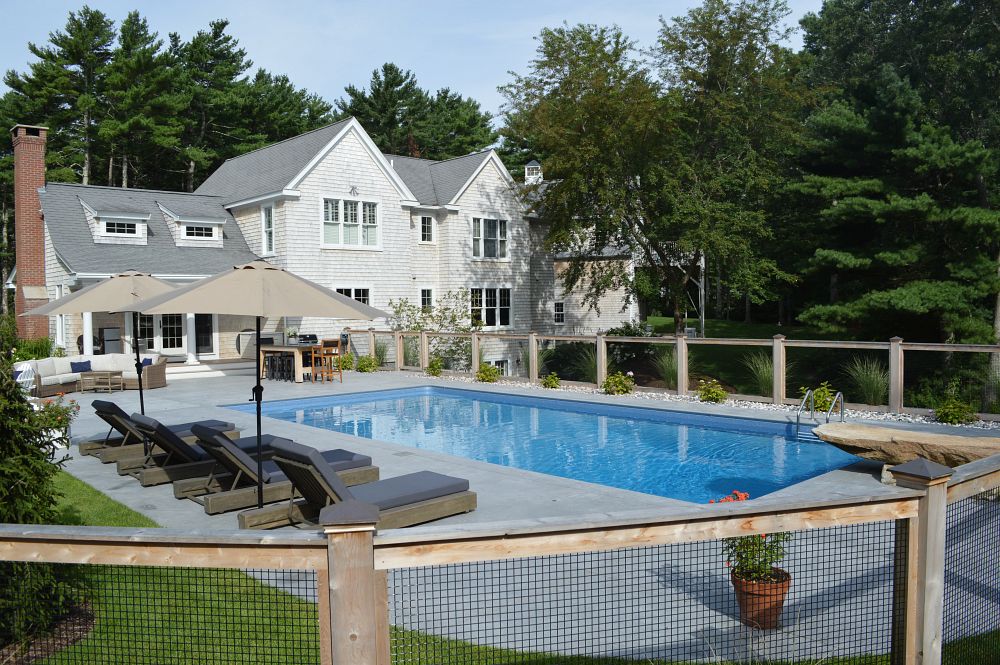
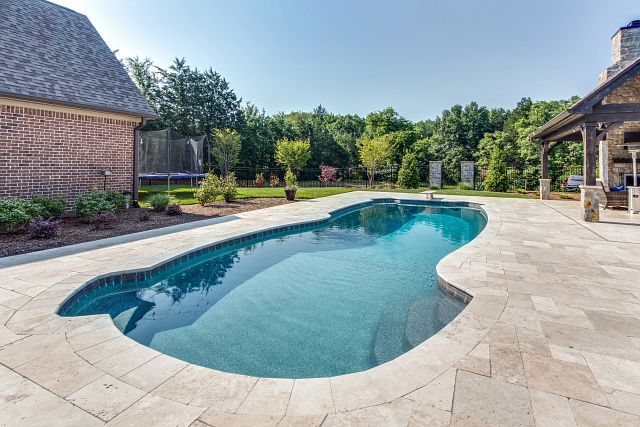
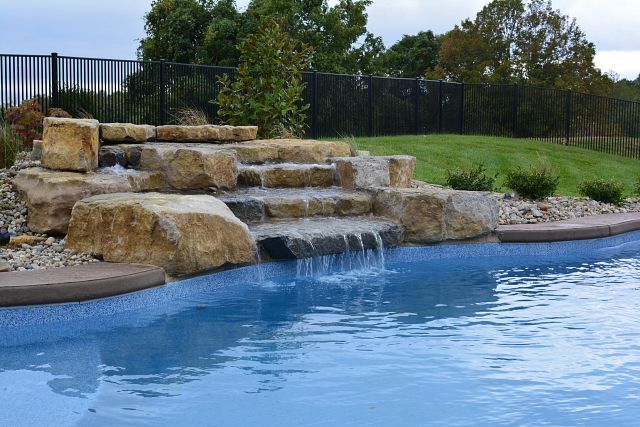
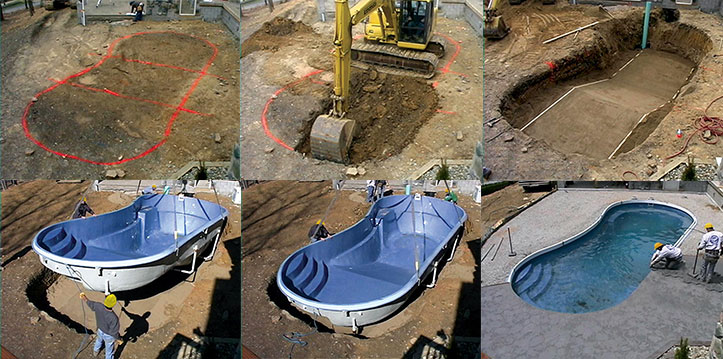
Join the discussion